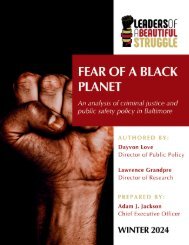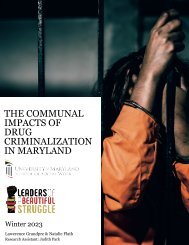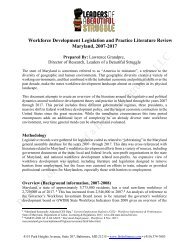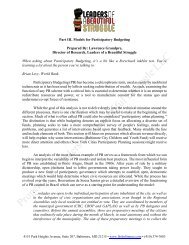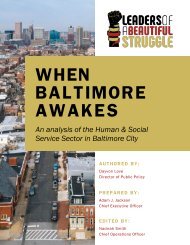Drug Decriminalization in Maryland Through an African Centered Research Paradigm- Analysis and Recommendations
This document offers guidance for theorizing questions related to a proposed research project purposed to advance drug decriminalization in Maryland.
This document offers guidance for theorizing questions related to a proposed research project purposed to advance drug decriminalization in Maryland.
- No tags were found...
You also want an ePaper? Increase the reach of your titles
YUMPU automatically turns print PDFs into web optimized ePapers that Google loves.
Holistic reason<strong>in</strong>g or logic is th<strong>in</strong>k<strong>in</strong>g predicated on at least two properties: the first is the<br />
union of affect (feel<strong>in</strong>g) <strong>an</strong>d thought (Ani, 1994; Bell, 1994), <strong>an</strong>d the second is the<br />
spiritualization of hum<strong>an</strong> be<strong>in</strong>gs. The union of affect <strong>an</strong>d thought recognizes the<br />
epistemological import<strong>an</strong>ce of both feel<strong>in</strong>gs <strong>an</strong>d thoughts <strong>an</strong>d that both c<strong>an</strong> be seen as two<br />
tr<strong>an</strong>sparent <strong>an</strong>d penetrable sides of the same co<strong>in</strong>. Acknowledg<strong>in</strong>g the <strong>in</strong>terconnectedness<br />
of feel<strong>in</strong>gs <strong>an</strong>d thought allows youths to make decisions that more completely tap the<br />
multidimensional makeup of their be<strong>in</strong>g. This allows young persons to get <strong>in</strong> touch with<br />
latent aspects of themselves that c<strong>an</strong> serve as<br />
new avenues through which to achieve a greater capacity for positive potentiality <strong>an</strong>d<br />
ch<strong>an</strong>ge. The spiritualization of hum<strong>an</strong> be<strong>in</strong>gs is the belief that at the core of the hum<strong>an</strong><br />
be<strong>in</strong>g is a spiritual essence that releases vast capabilities for <strong>in</strong>terconnectedness, or what<br />
Nobles (1980) calls "spiritual oneness." Br<strong>in</strong>g<strong>in</strong>g youths <strong>in</strong>to spiritual oneness helps them<br />
(1) to underst<strong>an</strong>d that they are spiritually, socially, <strong>an</strong>d mutually connected to others; (2)<br />
to acknowledge the sacredness of all hum<strong>an</strong> life; <strong>an</strong>d (3) to appreciate the m<strong>an</strong>y shades<br />
<strong>an</strong>d variations of hum<strong>an</strong> be<strong>in</strong>gs <strong>an</strong>d hum<strong>an</strong> experiences. This tr<strong>an</strong>sformation from<br />
materialistic/<strong>in</strong>dividualistic th<strong>in</strong>k<strong>in</strong>g to spiritual/holistic th<strong>in</strong>k<strong>in</strong>g among those who seek<br />
professional help c<strong>an</strong> be brought about by a therapeutic process known as the Belief<br />
Systems <strong>Analysis</strong> (see Myers, 1988).<br />
Although this help<strong>in</strong>g/heal<strong>in</strong>g process c<strong>an</strong> be conducted through direct, one-on-one<br />
practice, it should be noted that the Afrocentric paradigm of hum<strong>an</strong> services <strong>in</strong>variably<br />
views the broader society, <strong>in</strong> which the <strong>in</strong>dividual exists <strong>an</strong>d <strong>in</strong> which the Eurocentric<br />
worldview prevails, as be<strong>in</strong>g the primary target for ch<strong>an</strong>ge.<br />
There also is a role for hum<strong>an</strong> service workers who are policy practitioners. The<br />
government, at the federal, state, <strong>an</strong>d local levels, c<strong>an</strong> promote holistic logic <strong>an</strong>d spiritual<br />
wellness by support<strong>in</strong>g <strong>an</strong>d enact<strong>in</strong>g legislation that speaks more to meet<strong>in</strong>g the holistic<br />
<strong>an</strong>d spiritual needs of citizens as well as their material needs. One of the reasons for the<br />
existence of spiritual alienation is the downplay<strong>in</strong>g or repudiation of a holistic concept of<br />
hum<strong>an</strong>s by governmental agencies that place subst<strong>an</strong>tive emphasis on material <strong>an</strong>d<br />
physical needs. Although these needs are certa<strong>in</strong>ly import<strong>an</strong>t, this predom<strong>in</strong><strong>an</strong>t focus<br />
communicates, though subtly, to the citizen that needs of the soul <strong>an</strong>d <strong>in</strong>terpersonal<br />
relationships are less critical. The doma<strong>in</strong> of social welfare policy has been too restricted,<br />
<strong>an</strong>d social welfare policy <strong>an</strong>alysts <strong>an</strong>d practitioners should work more to reconceptualize<br />
the me<strong>an</strong><strong>in</strong>g of "welfare" to highlight hum<strong>an</strong> needs that speak more to spiritual <strong>an</strong>d<br />
<strong>in</strong>terpersonal development. Us<strong>in</strong>g their skills as <strong>an</strong>alysts <strong>an</strong>d practi--<br />
4151 Park Heights Avenue, Suite 207, Baltimore, MD 21215 • www.lbsbaltimore.com • (410) 374-7683




